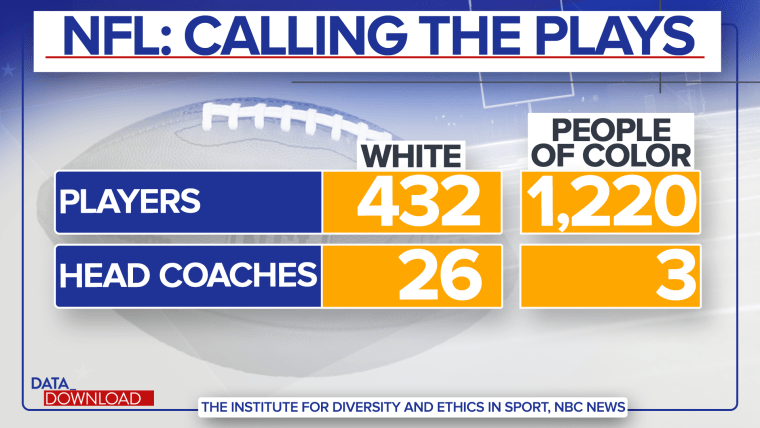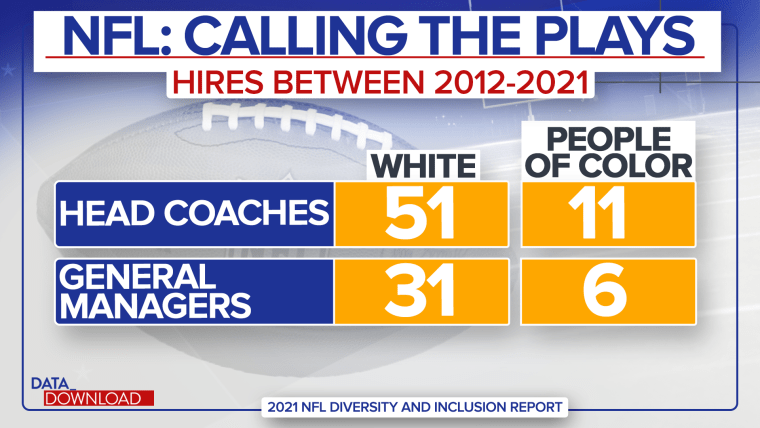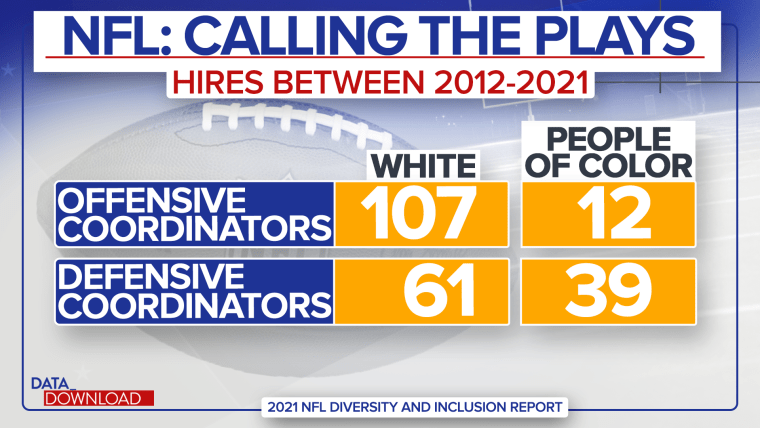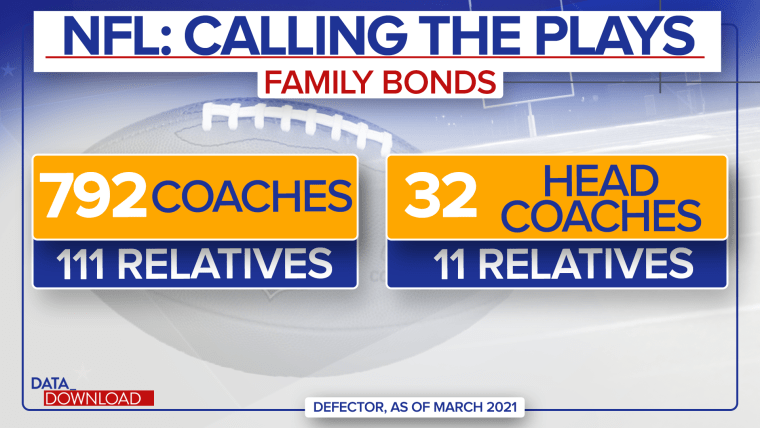WASHINGTON — The first week of February was supposed to be the beginning of 14 days of hype for the NFL leading up to next weekend's Super Bowl.
Instead, it turned out to be a week of headlines about racial inequality in the league's upper ranks.
On Tuesday, recently fired Miami Dolphins coach Brian Flores, who is Black, filed a class-action lawsuit against the NFL alleging racial discrimination in hiring processes across the league. Flores told a story about how he sat through an interview for a job he knew he wasn't going to get simply because the team was required to interview a minority candidate — part of the league's "Rooney Rule" to get more people of color in the coaching ranks.
Flores' suit has spawned a lot of discussion about who leads teams in the NFL, the most popular professional sports league in the U.S. The data show a huge racial discrepancy between who plays in the NFL and who coaches there.

In 2021, about 71 percent of the players in the NFL were people of color (that is, a race other than white), while only a quarter were white, according to the Institute for Diversity and Ethics in Sport at the University of Central Florida. The races of the other 4 percent weren't disclosed or specified.
Yet currently only three men of color have head coaching jobs in the league: the New York Jets' Robert Saleh, Pittsburgh's Mike Tomlin and Washington's Ron Rivera. The majority of the NFL's head coaching jobs — 24 of them — are held by white men. There are five vacancies, as well.
And that isn't a one-year, momentary aberration. The past 10 years have shown a very similar pattern in head coaching hires.

From 2012 to 2021, there were 62 head coaching hires in the league, and 51 of those jobs — 82 percent — went to white men, according to the NFL's 2021 Diversity and Inclusion Report. The 11 other jobs went to men of color.
And further up the chain of command, in the general managers' offices where head coaching hiring decisions are made, the numbers look almost exactly the same. Of 37 general manager positions filled in that period, 31 went to white men — that's about 84 percent. The six others went to men of color.
One big question is what's behind the pattern, and if you look closely at the numbers, you can see the depth of the forces underlying it.
First there's the issue of the candidate pool. Head coaching jobs generally go to those who previously held head coaching jobs, a group that is, obviously, predominantly white, or to one of the coordinators who manage a team's offense or defense. And a look at the same 2012-21 period shows that those jobs also usually go to white men, especially on the offensive side of the ball.

In that decade, NFL teams hired 119 offensive coordinators, and 107 of those positions went to white men, which is basically 90 percent. The figures were closer for defensive coordinators, but white men still held a strong advantage, capturing 61 of 100 defensive coordinator spots.
The gap in the offensive coordinator numbers is especially noteworthy. The modern NFL is driven by scoring, and offensive coordinators are often singled out for being creative and inventive, the kinds of people who get offers to be head coaches. Of the 62 head coaching jobs filled from 2012 to 2021, 31 went to men who had been offensive coordinators; only 18 went to defensive coordinators.
Another factor may be a lack of familial connection with those in the coaching ranks. More than in most other professions, NFL front offices seem to be interested in hiring from families that have deep roots in the league and the sport.

An article last month about nepotism in coaching on defector.com, a sports and culture journalism website, noted that of the 792 total coaching jobs in the NFL in March 2021, 111 were held by people who were related to current or former coaches, either biologically or through marriage. That's about 14 percent.
Among head coaches, the number was even higher. More than one-third of the head coaching jobs, 11 out of 32, were held by men who were related to current or former coaches, biologically or through marriage.
For those who follow the NFL, that might not be a big surprise. They've seen lot of familiar surnames prowl the sidelines, from Ryans to Shanahans to Carrolls.
But when you consider the other numbers and the points above, you can see some of the baked-in challenges to diversifying the NFL's head coaching ranks. It's hard to be from a "coaching family" when your racial or ethnic group hasn't held those positions in the past.
Add it all up and the numbers suggest that diversifying NFL coaching staffs and front offices might not be easy. Flores' lawsuit might be just the beginning of tackling what looks like a structural problem in the league.